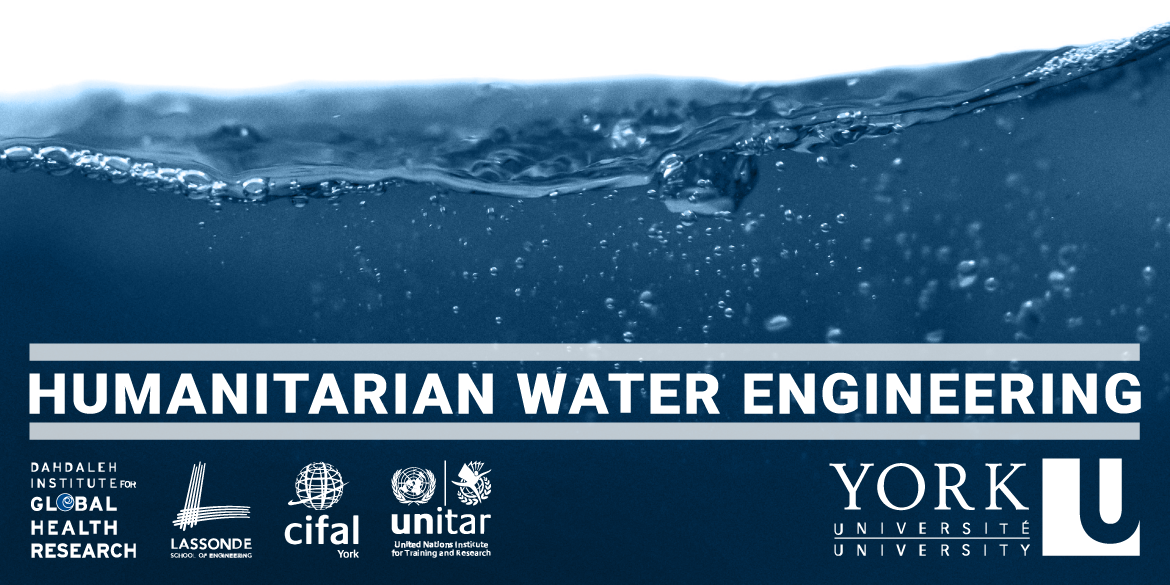
The Fall 2025 Course is now in session!
Applications are now closed. Sign up below to be notified about future courses.
Overview
Immerse yourself in a comprehensive learning journey on safe water in emergencies that blends theoretical knowledge with real-world applications. Through a mix of curated readings, engaging lectures from seasoned practitioners, interactive quizzes, and hands-on problem-based learning activities, you’ll master the essentials of designing and operating effective water supply systems in humanitarian emergencies.
Format
Over the course of twelve weeks, you will be immersed in a dynamic online learning journey, featuring expert-led lectures, curated readings, and collaborative problem-based learning activities, all facilitated by skilled and experienced instructors.
Content
Participants will gain an understanding of how to get safe water from sources to populations in precarious situations. The general objectives of the course are to:
I. Equip students to understand and assess a situation during an emergency.
II. Enable students to ask the right questions and know what they need to think about in a response.
III. Introduce students to the technical guidance out there in the sector and how to use it.
IV. Build confidence on how to design and implement effective water supply programs in emergencies.
The course provides a comprehensive overview of five core technical elements of safe water supply in emergencies:
- Water quality characterization and risk assessment
- Water source development (groundwater and surface waters)
- Water treatment methods, process selection, and design
- Safe water supply chain (distribution and delivery)
- Waterborne disease outbreak preparedness and response
Throughout the course, these technical elements are integrated with cross-cutting themes including humanitarian principles, WASH and public health, needs assessments, community engagement, and operational decision making, equipping participants with a holistic understanding of the challenges and solutions in humanitarian water engineering.
Learning methods
The course employs a blend of interactive teaching methods, including expert-led online lectures that combine engineering fundamentals with field applications, curated readings to deepen technical understanding, and knowledge-testing quizzes. A significant emphasis is placed on collaborative problem-based learning activities, facilitated by experienced instructors, where participants apply their learning to real-world challenges, fostering practical skills and critical thinking.
Application process
Applications are open between June 23 and August 31, 2025 and submitted applications are reviewed on a rolling basis. Qualified candidates will be invited to register and complete payment using the Eventbrite payment system by September 2. Total enrolment is limited to 54 participants, so the application system may close before the application deadline. Early application is encouraged.
Requirements
To participate in the Humanitarian Water Engineering Intensive Course, individuals must demonstrate some level of education, training, or experience in water engineering or humanitarian response. The course is particularly geared towards:
- Humanitarian professionals from UN agencies and international and local NGOs seeking to deepen their understanding and skills in water engineering within humanitarian contexts.
- Professional engineers and technical specialists aiming to apply their skills in humanitarian settings.
- Graduate students interested in expanding their technical knowledge and gaining insight into the humanitarian sector.
Additionally, a working fluency in English is essential since all course activities, including problem-based learning group work, will be conducted in English. Participants also need a stable and reliable internet connection with adequate bandwidth for online audio (and preferably video) meetings, and should be prepared to adjust to the scheduling of sessions across different time zones. This ensures active and effective participation in the course’s comprehensive online learning environment.
Why this course?
- Acquire essential knowledge and practical skills for designing and operating safe water supply systems in humanitarian crises.
- Learn from experienced practitioners and engineering faculty through lectures, case studies, and real-world problem-solving activities.
- Enhance your professional toolkit with cutting-edge approaches in water quality, treatment methods, and outbreak preparedness.
- Earn a certificate that showcases your commitment and expertise in humanitarian water engineering, potentially fulfilling continuing professional development (CPD) requirements.
- Join a global community of professionals and peers dedicated to improving WASH in emergencies.
Who is it for?
This course is designed for aspiring and current WASH practitioners, including humanitarian professionals, engineers, and graduate students seeking to deepen their knowledge and skills in water engineering for humanitarian response. It is particularly beneficial for those with a background in water engineering or humanitarian work, aiming to enhance their technical and operational capabilities in emergency and crisis settings.
Time commitment
The course is structured into a 2-week pre-reading phase followed by a 10-week intensive course phase consisting of five 2-week technical units. The total course time commitment is approximately 70 hours over 12 weeks. Participants should be ready to commit ~6 hours per week over the course of the 12 weeks.
Dates
| Applications open: | 23 June 2025 |
| Last day to apply: | 31 August 2025 |
| Registration deadline: | 2 September 2025 |
| Start date: | 4 September 2025 |
| End date: | 4 December 2025 |
Fees
We are pleased to be able to offer qualifying applicants a partially subsidized rate. Subsidized rate eligibility is determined based on the information provided at the application stage.
| Full fees: | $2,600 CAD |
| Subsidized fees: | $600 – $1,850 CAD |
All fees are subject to 13% Harmonized Sales Tax. Fees may be subject to change. Payment can be made by credit or debit card at the time of registration.
“The flow and the blending of the engineering fundamentals and field applications were well done. The case studies were well crafted and depict real life situations in the field. This made the team engagement very real. The guidance given by the facilitators was amazing. I have used the knowledge from the course to improve my WASH engagements in the field.”
The Humanitarian Water Engineering Intensive Course is an initiative of:
